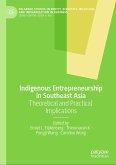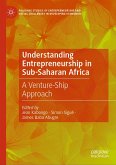Tying in the UN Sustainable Development Goals, the chapters examine how indigenous entrepreneurship relates to ending poverty, creating decent work and economic growth, reducing inequalities, contributing to sustainable cities and communities, and promoting peace, justice and strong institutions.
For researchers interested in how indigenous entrepreneurship practices in sub- Saharan Africa contest contemporary theories in entrepreneurship and management research, this work will prove a valuable resource with its much- needed case studies, quantitative and qualitative research, and practitioner perspectives.
Dieser Download kann aus rechtlichen Gründen nur mit Rechnungsadresse in A, B, BG, CY, CZ, D, DK, EW, E, FIN, F, GR, HR, H, IRL, I, LT, L, LR, M, NL, PL, P, R, S, SLO, SK ausgeliefert werden.









